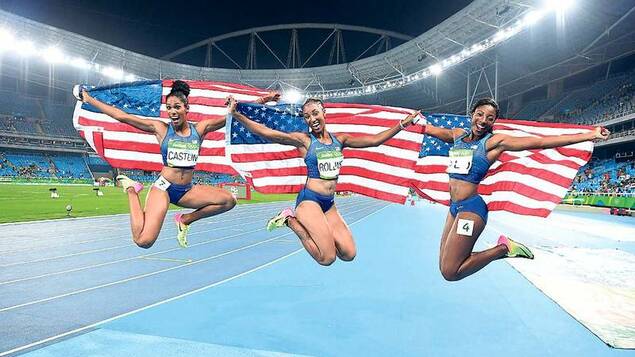Not only the king of athletes comes from the United States. The United States is the big winner in Rio Even before the last weekend, no anthem was heard more than the “Star Spangled Banner”. Homeland Celebrates – Americans love their flag and love to show strength. Fans on television, whether in sports bars or in living rooms from Alaska to Florida, celebrate their heroes as now 23-time Olympic champion Michael Phelps — and delight in the side stories provided by the media.
The United States is a sporting nation like no other. Since the fall of the Iron Curtain, they have dominated Olympic competitions, with the exception of Beijing 2008, America has always been at the top of the medal table. Targeted talent promotion and excellent training centers combined with the healthy ambition of young people and their parents have been the means to success for decades. Rio 2016 is no exception. Exceptional athletes like swimming icon Phelps or gymnastics star Simone Biles have become names making rounds in every bar.
But the United States is also a entertainment nation. Olympia agrees on both in an almost perfect way. Whether Bahamian runner Shauna Miller wins gold against American girl Alison Felix with a spear or Ryan Lochte at the gas station – everything is embellished in the media as an event and thus the subject of intense coverage.
Audience ratings and ad revenue speak volumes
US Champions Overseas, integral to a well-told story, ideally with the headline “Good vs. Evil”: Swimmer Lily King vs. her Russian opponent with a doping history – sold in the US. The fact that there are also convicted doping offenders such as sprinters Justin Gatlin and Tyson Gay on the US team – the NBC broadcaster is hardly worth mentioning.
Audience ratings and advertising revenue speak volumes. NBC spent $4.38 billion in 2011 on Olympic rights through 2020. He should come back. According to its own information, NBC sold ad minutes for $1.2 million in Rio alone. The announcer plays the game in its tried and tested way. Anyone who tunes in at prime time in the evening is initially surprised. The ratio of advertising to software is thought to be about two-thirds to one-third – in favor of advertising, mostly for products that promise mental and physical endurance in all situations. In prime times, the sports stages between two commercials are never more than seven minutes.
However, in these seven minutes, live sports from Rio are by no means necessarily presented. Flashbacks, cuts, side stories – the sport itself is only available in good bits when it seems like it’s more profitable in terms of advertising. The Invasion of Teams at the opening ceremony flashed about an hour late on American screens. The New York Times criticized “the few medals in NBC coverage.”
In the United States, only one derivation of reality has arrived from Ryo
NBC criticized the last bit of tension in the matches, on news platform Vox.com, which is the station’s broadcast method. NBC has already shown the important decisions of the Vancouver Winter Games about prime times related to advertising in the evening of 2010 – even if they occur during the day and the results have long been known. The world of Rio is real – what arrives in the US is a derivative of it, using synthetic tension braces.
Politicians love to use that, too. The sheer leadership at the medal table, the types of winners, the constant smiles of the athletes – none of this fits the picture that Donald Trump paints of a sick America standing on the edge of the abyss. His rival Hillary Clinton – perhaps not entirely coincidentally an “avowed Olympic fan” – is trying to use this right away. “Trump is the opposite of the Olympics,” she says. Clinton booked more than $5 million in campaign ads in the Olympic environment with NBC. Trump no. dpa

Communicator. Reader. Hipster-friendly introvert. General zombie specialist. Tv trailblazer

